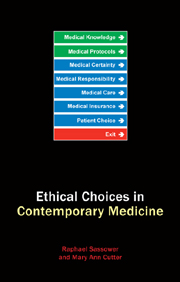2 - Medical epistemologies and goals
Summary
This chapter is devoted to a reconstruction of the history of medicine so as to draw attention to the promises and shortcomings of clinical medicine. We will include some of the debates among physician-philosophers about the nature of disease (as a cornerstone of medicine) discussed by Hippocrates and Galen, as well as later debates in modern Europe involving, for example, Sydenham and Sauvages, Morgagni and Boerhaave, Bichat and Virchow, and Harvey and Semmelweis. Our brief and cursory survey of some of these debates is undertaken with the explicit motivation of illustrating the extent to which the very framing of these debates highlights the reciprocity between theory and practice. By this we mean how one's practice informs one's knowledge, and, likewise, how one's knowledge informs one's practice. This reciprocity may seem transparent from a contemporary perspective when we realize that science is not purely theoretical or that technology, for example, is intimately concerned with its theoretical foundation. But in the past, the participants in these debates would overlook their theoretical prejudices and consider them obvious or irrelevant. Likewise, clinical insights were informed by one's culture and set Of beliefs, so that some “facts” were more readily observed than others. The intricacies of these historical contexts impose a lengthy discussion that goes beyond a simple framing of the process of knowing and valuing medical knowledge and treatment.
- Type
- Chapter
- Information
- Ethical Choices in Contemporary MedicineIntegrative Bioethics, pp. 38 - 70Publisher: Acumen PublishingPrint publication year: 2007

